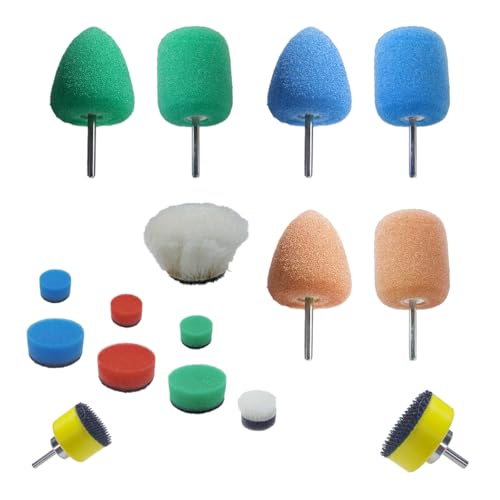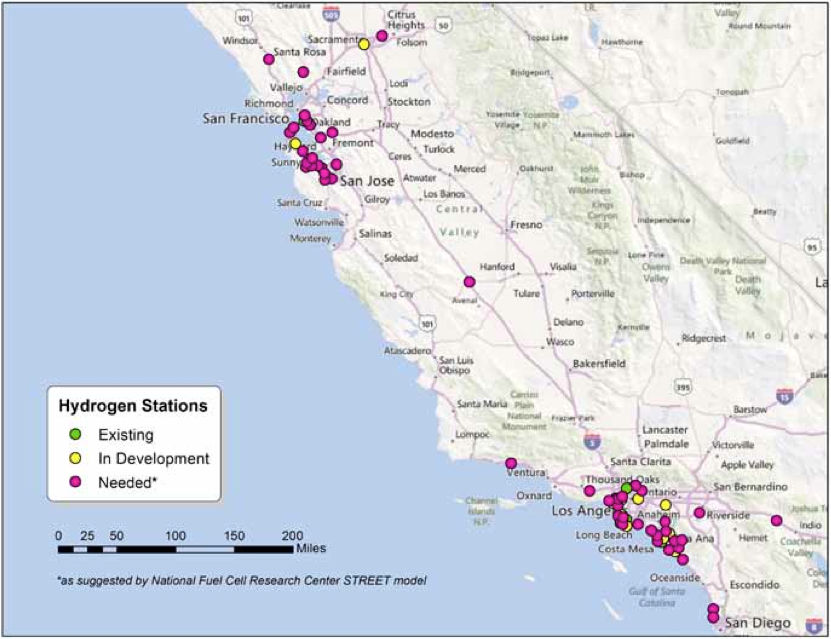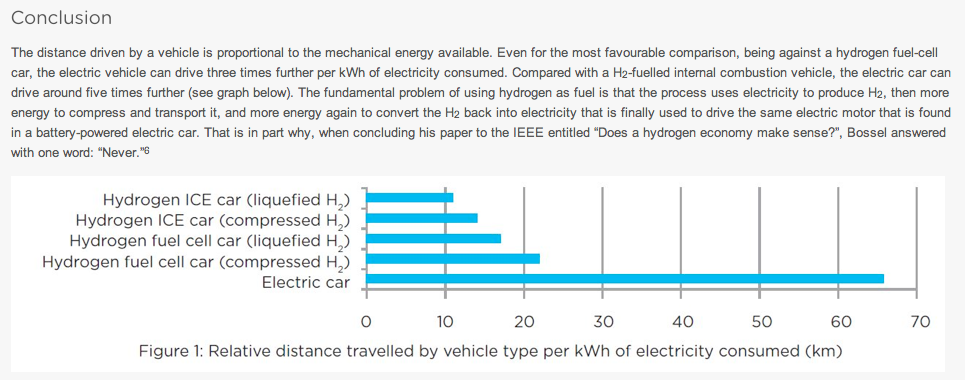TonyWilliams
Well-known member
[Moderator edit: relayed thread: http://www.myrav4ev.com/forum/viewtopic.php?p=19286#p19286]
The year 2003:
"Toyota believes that the execution of the retail program launch was very successful. A comprehensive marketing program, strong dealer support,and an enticing pricing level were keys to this success. However, sales levels were very low. As a result, no business case could be made for continuing sales of the RAV4 EV at these volumes. We believe that advances in hybrid technology and other advanced systems have a much greater potential for the environment and Toyota."
Oct 2014:
“The auto companies need to make zero-emission vehicles for Corporate Average Fuel Economy (CAFE) and other regulations, such as the California Air Resources Board’s zero emissions mandate, so they need to decide which pathway, EVs or FCVs, will lose the least amount of money. When most [manufacturers] investigate the two technologies, they see that FVCs offer more room for performance improvement and cost reduction potential. And that is why you will be seeing more fuel cells in the future”, says Former Toyota executive Bill Reinert, who recently retired as national manager of Toyota Motor Corporation’s advanced technology group.
http://e360.yale.edu/feature/interview_bill_reinert_bullish_on_hybrids_skeptical_about_electric_cars/2810/
http://insideevs.com/former-toyota-exec-future-of-electric-cars-is-dim/#comment-566470
http://www.toyota.com/esq/vehicles/regulatory/carb-mandate-for-zero-emission-vehicles.html
Toyota will build 2600 total Rav4 EV's for model years 2012-2014 for California Air Resources Board "Zero Emission Vehicle (CARB-ZEV) compliance for 3 credits each (if sold AND registered in California).
Toyota will offer a hydrogen powered car to comply with CARB-ZEV mandates for 2015-2017 that has a "300 mile range". They will earn 9 credits per vehicle until the 2017 model year (2018 model year reduced to 3 credits per vehicle). Click here for the thread on the Toyota hydrogen car.
Toyota hydrogen car costs $97,000
Smack down on hydrogen
The auto manufacturers comply with CARB so that they can sell millions of oil burning cars.
Go check out an H2 station, if you can find one. It will have gates, surveillance, security, big warning signs, etc. These stations are unbelievably expensive. An H2 station paid for by California costs one million dollars per year to operate in addition to the many millions to build and they have no cars to refuel. When they do have cars in 2015, it will be a few thousand total.
http://cafcp.org/carsandbuses/caroadmap
"By 2016, California should have 68 hydrogen stations throughout the state to serve the thousands of FCEV drivers expected in the early years of commercialization."
"About half of the 68 stations are open, in planning or have funding committed. An additional $65 million will provide support to build and operate stations until they become profitable."
Here's a Toyota exec from Europe talking about EV's in a not very favorable way:
http://green.autoblog.com/2013/06/11/toyota-exec-says-unless-electric-grid-is-clean-evs-make-little/
Why the Rav4 EV ? (1997-2003 and 2012-2014)
http://www.greencarreports.com/news/1068832_electric-cars-some-are-real-most-are-only-compliance-cars--we-name-names
It comes up often enough with comments like, "I heard they might / if they would / I wish they could just sell the Rav4 in (my home town) and make more of them.
Here's why they did build it and why they won't sell it in your hometown (although there are transfer credits for other CARB states) and why they won't build more than 2600 total in model years 2012-2014:
http://www.arb.ca.gov/msprog/zevprog/factsheets/zev_tutorial.pdf
CARB-ZEV Requirement
Tesla doesn't have to worry about any of that, as they just sell the credits (so far, for $63 million). Of course, Nissan has plenty of credits to sell, too.
The rest of the "Large Vehicle Manufacturers" (after Nissan with their LEAF electric car) are pretty much just supplying the absolute minimum "compliance vehicle" for California:
For 2015 and beyond, from CARB:
"BMW, Chrysler, Ford, General Motors, Honda, Hyundai, Kia, Mazda, Mercedes, Nissan, Toyota, and Volkswagen must comply with the new requirements. Four additional manufacturers would also be required to comply with the ZEV requirements, but would be allowed to meet their obligation with PHEVs."
For 2012-2014, 12% of production must meet Yearly ZEV requirements (including ZEV's, Enhanced AT PZEVs, ATPZEVs and PZEVs). Of that 12%, 0.79% must be ZEV.
Any type of ZEV may be used
Type V - 300+ miles range "hydrogen" ---- Credit per vehicle: 9**
Type V - 300+ miles range "fast refueling" - Credit per vehicle: 7
Type IV - 200+ miles range "fast refueling" - Credit per vehicle: 5
Type III - 100+ miles range "fast refueling" - Credit per vehicle: 4
Type III - 200+ miles range -------------- Credit per vehicle: 4
Type II - 100+ miles range --------------- Credit per vehicle: 3
Type I.5 - 75-100 miles range ----------- Credit per vehicle: 2.5
Type I - 50-75 miles range --------------- Credit per vehicle: 2
** hydrogen credit at 9 per vehicle for model years 2015-2017 only
After 2017, the credits for Type III, IV and V drop to 3
All manufacturers must report by May of the calendar year following the compliance model year; e.g., for 2008 model year, report is due may 1, 2009. Manufacturers may update reports until September. Manufacturers have two years to make up a ZEV deficit, or they are subject to penalties outlines in Health and Safety Code 43211:
$5000 penalty per vehicle CREDIT not produced.
In form below,
NMOG = Non-Methane Organic Gas
http://www.arb.ca.gov/msprog/macs/macs.htm
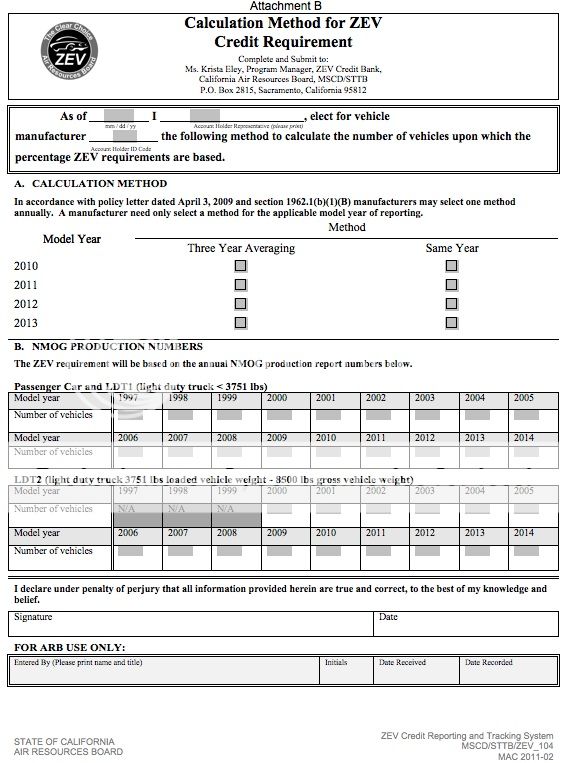
From May 10, 2013 Tesla filing:
Tesla statement on Toyota RAV4 Program
In July 2011, we entered into a supply and services agreement with Toyota for the supply of a validated electric powertrain system, including a battery pack, charging system, inverter, motor, gearbox and associated software for integration into the electric vehicle version of the Toyota RAV4. Additionally, we provide Toyota with certain services related to the supply of the electric powertrain system. During the three months ended March 31, 2012, we began delivering electric powertrain systems to Toyota. During the three months ended March 31, 2013 and 2012, we recognized revenue of $14.4 million and $0.3 million in automotive sales, respectively.
In October 2010, we entered into a Phase 1 contract services agreement with Toyota for the development of the electric powertrain system for the Toyota RAV4 electric vehicle. Toyota paid $60.1 million for the successful completion of certain at risk development milestones and the delivery of prototype samples, including a $5.0 million upfront payment that we received upon the execution of the agreement. During the three months ended March 31, 2012, we completed various milestones and along with the amortization of our upfront payment and the delivery of certain prototype samples, we recognized $10.7 million in development services revenue. As of March 31, 2012, all development milestones under the Phase 1 agreement had been completed; therefore, no further development services revenue under the Phase 1 agreement have been recorded subsequently.
*********************************
Repost from another thread:
Toyota is no doubt becoming increasingly agitated with out of state sales. This isn't hard to figure out, folks!!! They built the car for one reason, and it is costing them TENS of millions of dollars to sell them to you (so they can sell oil burner cars in California and other CARB states). They can't prevent a dealer from doing "interstate commerce", but they can make it difficult for you to own and purchase the car out of state.
We have already seen the scheme of dealers not getting paid for service and warranty repairs who are out of state (and therefore are not certified dealers).
1. Intentionally limiting sales to California only
2. No unlimited mileage leases out of state... already happening.
3. Harassing dealers who want to service / warranty repair the car by not paying them!!! Yes, it's happening.
4. Limiting the listing of charging stations in the Navigation unit to show only California locations
5. Limiting the discounts on the car to only California sales and registration
In the future, I predict different incentives for out of state, to wit:
6. Different Toyota interest rate / lease money factors on sales out of state
7. Limiting the car in some obtuse way (making Entunes not work, or some other petty method to make the car less attractive out of state)
8. Limited parts availability to non-California states (i.e., you can't even pay cash for the parts, let alone get warranty repairs)
9. Any other way that the lawyers will sign off on to make sure that the car is likely to be sold and registered only in California through 2014 model year
So, for out-of-state buyers, things will get worse, I ABSOLUTELY GUARANTEE IT.
For instate, the discounts will likely go down until they feel the pressure to sell model year 2014 cars. The CARB-ZEV credits are attached to the model year.
***************************
Click here to see what Toyota and the rest of the auto manufacturing business were up to, weeks after releasing the Rav4 EV Gen II. How to slow down electric vehicles, second act.
Auto manufacturer's Oct 19, 2012 request to EPA for waiver from CARB:
http://www.globalautomakers.org/sites/default/files/document/attachments/JointCommentsCAWaiverRequest10-19-12.pdf
"It is highly unlikely that the required infrastructure and the level of consumer demand for ZEVs will be sufficient by MY2018 in either California or in the individual Section 177 States to support the ZEV sales requirements mandated by CARB. EPA should therefore deny, at the present time, California’s waiver request for the ZEV program for these model years. During the interim, Global Automakers and the Alliance believe that California and EPA, with full auto industry participation, should implement a review for the ZEV program similar to the mid-term review process adopted under the federal GHG and CAFE regulations for MYs2017 through 2025."
That's a whole lot of gobbledy goop to say, "keep the traveling provision so we can only sell cars in California at the minimum number, and not sell any in the other CARB states."
CARB-ZEV state coalition - California, New York, Massachusetts, Oregon, Vermont, Maryland, Connecticut and Rhode Island. Maine and New Jersey are participating with ZEV initiatives, but are not signatory CARB-ZEV states.
The eight states combined account for 23% of U.S. vehicle sales, according to California’s Air Resources, and all ten states make up 28%.
The year 2003:
"Toyota believes that the execution of the retail program launch was very successful. A comprehensive marketing program, strong dealer support,and an enticing pricing level were keys to this success. However, sales levels were very low. As a result, no business case could be made for continuing sales of the RAV4 EV at these volumes. We believe that advances in hybrid technology and other advanced systems have a much greater potential for the environment and Toyota."
Oct 2014:
“The auto companies need to make zero-emission vehicles for Corporate Average Fuel Economy (CAFE) and other regulations, such as the California Air Resources Board’s zero emissions mandate, so they need to decide which pathway, EVs or FCVs, will lose the least amount of money. When most [manufacturers] investigate the two technologies, they see that FVCs offer more room for performance improvement and cost reduction potential. And that is why you will be seeing more fuel cells in the future”, says Former Toyota executive Bill Reinert, who recently retired as national manager of Toyota Motor Corporation’s advanced technology group.
http://e360.yale.edu/feature/interview_bill_reinert_bullish_on_hybrids_skeptical_about_electric_cars/2810/
http://insideevs.com/former-toyota-exec-future-of-electric-cars-is-dim/#comment-566470
http://www.toyota.com/esq/vehicles/regulatory/carb-mandate-for-zero-emission-vehicles.html
Toyota will build 2600 total Rav4 EV's for model years 2012-2014 for California Air Resources Board "Zero Emission Vehicle (CARB-ZEV) compliance for 3 credits each (if sold AND registered in California).
Toyota will offer a hydrogen powered car to comply with CARB-ZEV mandates for 2015-2017 that has a "300 mile range". They will earn 9 credits per vehicle until the 2017 model year (2018 model year reduced to 3 credits per vehicle). Click here for the thread on the Toyota hydrogen car.
Toyota hydrogen car costs $97,000
Smack down on hydrogen
The auto manufacturers comply with CARB so that they can sell millions of oil burning cars.
Go check out an H2 station, if you can find one. It will have gates, surveillance, security, big warning signs, etc. These stations are unbelievably expensive. An H2 station paid for by California costs one million dollars per year to operate in addition to the many millions to build and they have no cars to refuel. When they do have cars in 2015, it will be a few thousand total.
http://cafcp.org/carsandbuses/caroadmap
"By 2016, California should have 68 hydrogen stations throughout the state to serve the thousands of FCEV drivers expected in the early years of commercialization."
"About half of the 68 stations are open, in planning or have funding committed. An additional $65 million will provide support to build and operate stations until they become profitable."
Here's a Toyota exec from Europe talking about EV's in a not very favorable way:
http://green.autoblog.com/2013/06/11/toyota-exec-says-unless-electric-grid-is-clean-evs-make-little/
Why the Rav4 EV ? (1997-2003 and 2012-2014)
http://www.greencarreports.com/news/1068832_electric-cars-some-are-real-most-are-only-compliance-cars--we-name-names
It comes up often enough with comments like, "I heard they might / if they would / I wish they could just sell the Rav4 in (my home town) and make more of them.
Here's why they did build it and why they won't sell it in your hometown (although there are transfer credits for other CARB states) and why they won't build more than 2600 total in model years 2012-2014:
http://www.arb.ca.gov/msprog/zevprog/factsheets/zev_tutorial.pdf
CARB-ZEV Requirement
Tesla doesn't have to worry about any of that, as they just sell the credits (so far, for $63 million). Of course, Nissan has plenty of credits to sell, too.
The rest of the "Large Vehicle Manufacturers" (after Nissan with their LEAF electric car) are pretty much just supplying the absolute minimum "compliance vehicle" for California:
Ford Focus EV
Honda Fit EV
Chrysler/Fiat 500e
Toyota Rav4 EV
GM Chevrolet Spark EV
For 2015 and beyond, from CARB:
"BMW, Chrysler, Ford, General Motors, Honda, Hyundai, Kia, Mazda, Mercedes, Nissan, Toyota, and Volkswagen must comply with the new requirements. Four additional manufacturers would also be required to comply with the ZEV requirements, but would be allowed to meet their obligation with PHEVs."
For 2012-2014, 12% of production must meet Yearly ZEV requirements (including ZEV's, Enhanced AT PZEVs, ATPZEVs and PZEVs). Of that 12%, 0.79% must be ZEV.
Any type of ZEV may be used
Type V - 300+ miles range "hydrogen" ---- Credit per vehicle: 9**
Type V - 300+ miles range "fast refueling" - Credit per vehicle: 7
Type IV - 200+ miles range "fast refueling" - Credit per vehicle: 5
Type III - 100+ miles range "fast refueling" - Credit per vehicle: 4
Type III - 200+ miles range -------------- Credit per vehicle: 4
Type II - 100+ miles range --------------- Credit per vehicle: 3
Type I.5 - 75-100 miles range ----------- Credit per vehicle: 2.5
Type I - 50-75 miles range --------------- Credit per vehicle: 2
** hydrogen credit at 9 per vehicle for model years 2015-2017 only
After 2017, the credits for Type III, IV and V drop to 3
All manufacturers must report by May of the calendar year following the compliance model year; e.g., for 2008 model year, report is due may 1, 2009. Manufacturers may update reports until September. Manufacturers have two years to make up a ZEV deficit, or they are subject to penalties outlines in Health and Safety Code 43211:
$5000 penalty per vehicle CREDIT not produced.
In form below,
NMOG = Non-Methane Organic Gas
http://www.arb.ca.gov/msprog/macs/macs.htm

From May 10, 2013 Tesla filing:
Tesla statement on Toyota RAV4 Program
In July 2011, we entered into a supply and services agreement with Toyota for the supply of a validated electric powertrain system, including a battery pack, charging system, inverter, motor, gearbox and associated software for integration into the electric vehicle version of the Toyota RAV4. Additionally, we provide Toyota with certain services related to the supply of the electric powertrain system. During the three months ended March 31, 2012, we began delivering electric powertrain systems to Toyota. During the three months ended March 31, 2013 and 2012, we recognized revenue of $14.4 million and $0.3 million in automotive sales, respectively.
In October 2010, we entered into a Phase 1 contract services agreement with Toyota for the development of the electric powertrain system for the Toyota RAV4 electric vehicle. Toyota paid $60.1 million for the successful completion of certain at risk development milestones and the delivery of prototype samples, including a $5.0 million upfront payment that we received upon the execution of the agreement. During the three months ended March 31, 2012, we completed various milestones and along with the amortization of our upfront payment and the delivery of certain prototype samples, we recognized $10.7 million in development services revenue. As of March 31, 2012, all development milestones under the Phase 1 agreement had been completed; therefore, no further development services revenue under the Phase 1 agreement have been recorded subsequently.
*********************************
Repost from another thread:
Toyota is no doubt becoming increasingly agitated with out of state sales. This isn't hard to figure out, folks!!! They built the car for one reason, and it is costing them TENS of millions of dollars to sell them to you (so they can sell oil burner cars in California and other CARB states). They can't prevent a dealer from doing "interstate commerce", but they can make it difficult for you to own and purchase the car out of state.
We have already seen the scheme of dealers not getting paid for service and warranty repairs who are out of state (and therefore are not certified dealers).
1. Intentionally limiting sales to California only
2. No unlimited mileage leases out of state... already happening.
3. Harassing dealers who want to service / warranty repair the car by not paying them!!! Yes, it's happening.
4. Limiting the listing of charging stations in the Navigation unit to show only California locations
5. Limiting the discounts on the car to only California sales and registration
In the future, I predict different incentives for out of state, to wit:
6. Different Toyota interest rate / lease money factors on sales out of state
7. Limiting the car in some obtuse way (making Entunes not work, or some other petty method to make the car less attractive out of state)
8. Limited parts availability to non-California states (i.e., you can't even pay cash for the parts, let alone get warranty repairs)
9. Any other way that the lawyers will sign off on to make sure that the car is likely to be sold and registered only in California through 2014 model year
So, for out-of-state buyers, things will get worse, I ABSOLUTELY GUARANTEE IT.
For instate, the discounts will likely go down until they feel the pressure to sell model year 2014 cars. The CARB-ZEV credits are attached to the model year.
***************************
Click here to see what Toyota and the rest of the auto manufacturing business were up to, weeks after releasing the Rav4 EV Gen II. How to slow down electric vehicles, second act.
Auto manufacturer's Oct 19, 2012 request to EPA for waiver from CARB:
http://www.globalautomakers.org/sites/default/files/document/attachments/JointCommentsCAWaiverRequest10-19-12.pdf
"It is highly unlikely that the required infrastructure and the level of consumer demand for ZEVs will be sufficient by MY2018 in either California or in the individual Section 177 States to support the ZEV sales requirements mandated by CARB. EPA should therefore deny, at the present time, California’s waiver request for the ZEV program for these model years. During the interim, Global Automakers and the Alliance believe that California and EPA, with full auto industry participation, should implement a review for the ZEV program similar to the mid-term review process adopted under the federal GHG and CAFE regulations for MYs2017 through 2025."
That's a whole lot of gobbledy goop to say, "keep the traveling provision so we can only sell cars in California at the minimum number, and not sell any in the other CARB states."
CARB-ZEV state coalition - California, New York, Massachusetts, Oregon, Vermont, Maryland, Connecticut and Rhode Island. Maine and New Jersey are participating with ZEV initiatives, but are not signatory CARB-ZEV states.
The eight states combined account for 23% of U.S. vehicle sales, according to California’s Air Resources, and all ten states make up 28%.






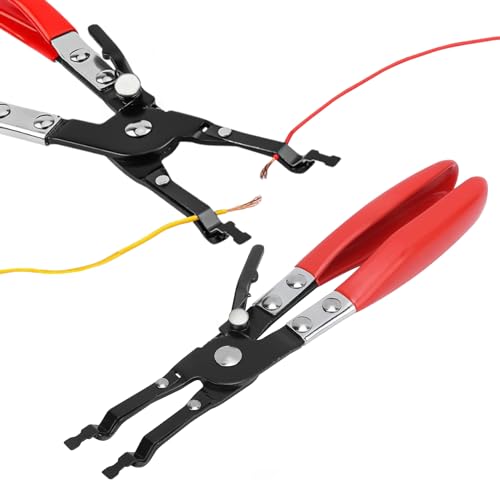





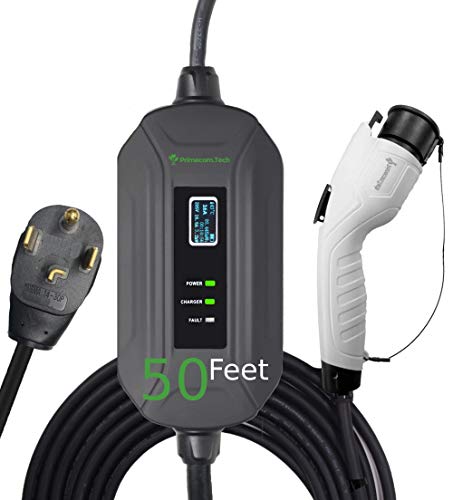




![Car Charger Adapter - [Upgraded Version] Car Fast Charger with 4 Ports (PD+QC3.0+USB C) Atmosphere Light - 12-24V Car Truck SUV Universal USB Cigarette Lighter Adapter(QC3.0+PD+2.4A+2.4A)](https://m.media-amazon.com/images/I/41TzjUqcNaL._SL500_.jpg)












